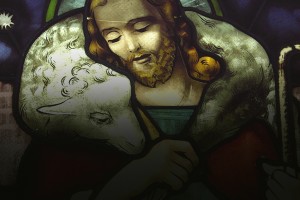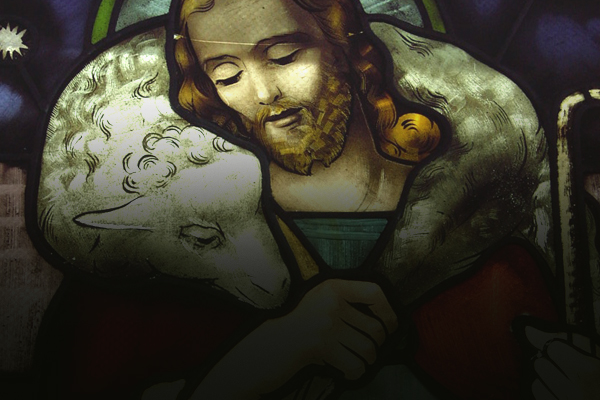
1. Is He A Real Man?
Before we can begin to examine the claims Christianity makes about Jesus, we’ll have to examine the historicity of Jesus and decide if He ever truly lived.
The Claim
Jesus was a real person. He existed in history. He was as human as you or me. People who accept this first level of understanding about Jesus are simply acknowledging He was a real historical person.
The Basis
This claim is based on the strength of the eyewitness accounts (known as Gospels) and on the secondary secular accounts of historians who recorded the subsequent movement in the 1st Century called “Christianity”. The Gospel writers claimed they were simply recording their eyewitness observations:
2 Peter 1:16-17
We did not follow cleverly invented stories when we told you about the power and coming of our Lord Jesus Christ, but we were eyewitnesses of his majesty.
1 John 1:1-2
That which was from the beginning, which we have heard, which we have seen with our eyes, which we have looked at and our hands have touched-this we proclaim concerning the Word of life. The life appeared; we have seen it and testify to it, and we proclaim to you the eternal life, which was with the Father and has appeared to us.
Non-Christian accounts also report on the person of Jesus and the movement resulting from Jesus’ life. The following writers recorded the historicity of Jesus and His followers:
Thallus (52AD)
Pliny the Younger (61-113AD)
Suetonius (69-140AD)
Tacitus (56-120AD)
Mara Bar-Serapion (70AD)
Phlegon (80-140AD)
Lucian of Samosata: (115-200 A.D.)
Celsus (175AD)
The Challenge
Many challenge the historicity of Jesus. A growing number of atheists claim Jesus never actually lived and was simply a re-fabrication of prior mythologies such as Mithras. These doubters typically challenge the reliability of the Gospels eyewitness accounts, although much can be offered as evidence the accounts are timely and accurate.
In addition, many skeptics argue there are no contemporary early non-Christian eyewitness accounts dating back to the lifetime of Jesus. The only eyewitness records we have are from men who became followers of Jesus, and they simply don’t trust these Christian writers. But the eyewitnesses who observed Jesus so closely (those men who witnessed his life, teachings and miracles) were so convinced by what they saw they eventually became followers of Jesus. In essence, those who saw came to believe. It would be unfair to discard their testimony. Many (such as Matthew) began without a presuppositional bias toward Jesus, but were impressed by what they saw in their time with Jesus. As a result, they came to believe Jesus was who He said He was. The life, ministry death and resurrection of Jesus became the foundation for their own transformation from skeptic to believer; they were not biased beforehand, but convinced afterward.
Some critics also argue the appearance of Jesus did not draw the kind of attention it should have if He was in fact, the Savior of mankind. Why do we only have four eyewitness accounts? Why aren’t there more? Why wasn’t there more of a ripple effect in recorded history? Shouldn’t’ there have been more written about Him? As it turns out, there was quite a bit more written about Him. The appearance of Jesus did cause quite a stir in recorded history. In fact, in addition to the trustworthy eyewitness accounts, an incredible amount of legend arose around the figure of Jesus. For many years following His life, this legend continued to grow and hundreds of documents were written about Him. There are many non-canonical gospels and legendary tales, just as we would expect. When a legendary figure appears on the landscape of history, legend begins to appear alongside the truth. This is what we should expect if Jesus actually lived and did what the Gospels claim.
The Adherents
Many people accept this first narrow claim related to the historicity of Jesus, believing He was simply a man who lived in history. The following people would accept this first incremental definition of Jesus:
Christians, Many Atheists, Muslims, Jews, Mormons, Jehovah’s Witnesses, Baha’i, Many Eastern Religions
2. Is He A Great Moral Teacher?
Now, beginning with the assumption Jesus was a real man, let’s take another step in our understanding of Jesus in an effort to better describe His nature. Was Jesus a real man who was also a great moral teacher?
The Claim
Even those who reject the possibility of the supernatural or the existence of God may accept the idea Jesus was a real man who lived in the ancient past. And many of these folks also have no problem accepting the additional claim Jesus was also a great moral teacher.
The Basis
Few people would reject Jesus as among the greatest of moral teachers, based on his sermons and proclamations related to moral behavior. Even atheists who attack the moral character of the God of the Old Testament (citing the God-directed treatment of the enemies of Israel, for example), will usually embrace the moral teaching of Jesus. They are aware of the moral proclamations Jesus made in His most famous sermons:
Luke 6:27-38
“But I say to you who hear, love your enemies, do good to those who hate you, bless those who curse you, pray for those who mistreat you. Whoever hits you on the cheek, offer him the other also; and whoever takes away your coat, do not withhold your shirt from him either. Give to everyone who asks of you, and whoever takes away what is yours, do not demand it back. Treat others the same way you want them to treat you. If you love those who love you, what credit is that to you? For even sinners love those who love them. If you do good to those who do good to you, what credit is that to you? For even sinners do the same. If you lend to those from whom you expect to receive, what credit is that to you? Even sinners lend to sinners in order to receive back the same amount. But love your enemies, and do good, and lend, expecting nothing in return; and your reward will be great, and you will be sons of the Most High; for He Himself is kind to ungrateful and evil men. Be merciful, just as your Father is merciful. Do not judge, and you will not be judged; and do not condemn, and you will not be condemned; pardon, and you will be pardoned. Give, and it will be given to you. They will pour into your lap a good measure–pressed down, shaken together, and running over. For by your standard of measure it will be measured to you in return.”
Few people reject the moral power of Jesus’ teachings, and the concepts of love and mercy He proposed are still as radical today as they were over two thousand years ago. Most people in our culture embrace Jesus’ moral teaching even if they are not Christians, and most other world religions reflect similar moral principles transcending time and place.
The Challenge
But if we are going to consider the truth of all Jesus’ teaching, we simply cannot limit ourselves to those teachings we happen to like or admire. We must also recognize and reconcile the most important truth Jesus ever taught. Jesus taught His followers He was God.
John 8:58-59
“I tell you the truth,” Jesus answered, “before Abraham was born, I am (Jesus used the very title God Himself used in Exodus 3:14)!” At this, they picked up stones to stone him, but Jesus hid himself, slipping away from the temple grounds.
John 14:6-9
Jesus answered, “I am the way and the truth and the life. No one comes to the Father except through me. If you really knew me, you would know my Father as well. From now on, you do know him and have seen him.” Philip said, “Lord, show us the Father and that will be enough for us.” Jesus answered: “Don’t you know me, Philip, even after I have been among you such a long time? Anyone who has seen me has seen the Father”.
So, how do we someone who claims to teach moral truth, yet is crazy enough to claim He is God? Was he simply lying to us? If that is true, how can He be a great moral teacher and a liar at the same time?
The Adherents
With the additional claim Jesus was a great moral teacher, our list of adherents will shrink slightly. For one reason or another, many atheists resist the moral teaching of Jesus as it limits their own personal behavior. So let’s see how our list may have changed:
Christians, Many Some Atheists, Muslims, Jews, Mormons, Jehovah’s Witnesses, Baha’i, Many Eastern Religions
3. Is He A Prophet of God?
Let’s raise the bar a little higher on this man we know as Jesus. We’ve already made the claim He was a real man who lived in history, and the claim He was a great moral teacher. Let’s add the additional claim He was a prophet of God:
The Claim
Those who believe Jesus was a great moral teacher may search for the foundation of this teaching, and when they do, they often decide God Himself was the source of moral truth Jesus proclaimed. Many conclude Jesus, speaking as a prophet of God, had special revelation from God in the tradition of other prophets who had predictive powers.
The Basis
This belief Jesus is a prophet of God is often based on two observations. First, it is clear Jesus had the power to predict the future. He made several accurate predictions:
Luke 22:33-34
But he (Peter) replied, ‘Lord, I am ready to go with you to prison and to death.’ Jesus answered, ‘I tell you, Peter, before the rooster crows today, you will deny three times that you know me.’
Luke 21:23-24
There will be great distress in the land and wrath against this people. They will fall by the sword and will be taken as prisoners to all the nations. Jerusalem will be trampled on by the Gentiles until the times of the Gentiles are fulfilled.
Matthew 24:1-2
Jesus left the temple and was walking away when his disciples came up to him to call his attention to its buildings. ‘Do you see all these things?’ he asked. ‘I tell you the truth, not one stone here will be left on another; every one will be thrown down.’
Matthew 16:16-18
Simon Peter answered, ‘You are the Christ, the Son of the living God.’ Jesus replied, ‘Blessed are you, Simon son of Jonah, for this was not revealed to you by man, but by my Father in heaven. And I tell you that you are Peter, and on this rock I will build my church, and the gates of Hades will not overcome it.
Matthew 24:14
And this gospel of the kingdom will be preached in the whole world as a testimony to all nations, and then the end will come.
Luke 21:33
Heaven and earth will pass away, but my words will never pass away.
In addition to this, Jesus also made proclamations about what is blessed and what is cursed in a manner very similar to the Old Testament prophets who spoke for God:
Luke 6:20-26
And turning His gaze toward His disciples, He began to say,
Blessed are you who are poor, for yours is the kingdom of God.
Blessed are you who hunger now, for you shall be satisfied.
Blessed are you who weep now, for you shall laugh.
Blessed are you when men hate you, and ostracize you, and insult you, and scorn your name as evil, for the sake of the Son of Man.
Be glad in that day and leap for joy, for behold, your reward is great in heaven For in the same way their fathers used to treat the prophets. But…
Woe to you who are rich, for you are receiving your comfort in full.
Woe to you who are well-fed now, for you shall be hungry.
Woe to you who laugh now, for you shall mourn and weep.
Woe to you when all men speak well of you, for their fathers used to treat the false prophets in the same way.
Over and over again, Jesus proclaimed truth as though He was speaking from some authority greater than Himself, and in this way, He seemed to be acting as a prophet in a manner consistent with Old Testament prophets.
The Challenge
But there is something distinctly different about the way Jesus spoke when compared to other prophets of old. Look at how Old Testament prophets prefaced their statements when speaking for God:
Isaiah 10:24
Therefore, this is what the Lord, the LORD Almighty, says: “O my people who live in Zion, do not be afraid of the Assyrians, who beat you with a rod and lift up a club against you, as Egypt did.”
This is the common preface given by Old Testament prophets. They would typically begin by saying, “Thus saith the Lord” or “the word of the Lord came to me”, or in more modern translations, “This is what the Lord says”. But this is NOT how Jesus prefaced His statements. Over and over again, Jesus typically started His teaching with the expressions we remember from the King James Bible, “verily, verily, I say to you…”, or in more modern language, “I tell you the truth…”
Matthew 5:18
I tell you the truth, until heaven and earth disappear, not the smallest letter, not the least stroke of a pen, will by any means disappear from the Law until everything is accomplished
Jesus spoke not as someone who was speaking for God, but as someone who was speaking as God. Jesus appeared to be making claims exceeding those of a “prophet”.
The Adherents
This additional claim about Jesus (His status as a prophet of God) has an impact on our list of adherents. Fewer people would accept this additional claim:
Christians, Some Atheists, Muslims, Jews, Mormons, Jehovah’s Witnesses, Baha’i, Many Eastern Religions
4. Is He A Prophet of God with Supernatural Powers?
If we follow the evidence trail related to the claims we could make about the person of Jesus, the next logical step in our understanding would be to make the claim Jesus was actually more than just a man, a great moral teacher, and a prophet of God. Was Jesus also a prophet of God who had supernatural powers?
The Claim
People who accept the fact Jesus spoke prophetically and made proclamations with the authority of God, may also believe this additional claim related to Jesus’ power to control the forces of nature and perform miracles. Those who trust the Scripture is accurately recording the prophetic proclamations of Jesus may also trust what the scriptures describe about Jesus’ supernatural abilities.
The Basis
The Bible describes a long list of miracles performed by Jesus. A quick review of the Gospels reveals a partial list:
He turned water into wine (John 2:1-11)
He healed a nobleman’s son (John 4:46-54)
He healed an impotent man at Bethsaida (John 5:1-9)
He healed a man who was born blind (John 9:1-7)
He raised Lazarus from the dead (John 11:38-44)
He produced the catch of fishes (John 21:1-14)
He cured two blind men (Matt 9:27-31)
He produced a piece of money in a fish’s mouth (Matt 17:24-27)
He healed a deaf and dumb man (Mark 7:31-37)
He healed the blind man of Bethsaida (Mark 8:22-26)
He passed unseen through the crowd (Luke 4:28-30)
He produced the miraculous catch of fishes (Luke 5:4-11)
He raised the widow’s son at Nain (Luke 7:11-18)
He healed a woman with the spirit of infirmity (Luke 13:11-17)
He healed a man with the dropsy (Luke 14:1-6)
He healed the ten lepers (Luke 17:11-19)
He healed Malchus (Luke 22:50, 51)
He healed the Syrophoenician woman’s daughter (Matt 15:28; Mark 7:24)
He miraculously fed four thousand (Matt 15:32; Mark 8:1)
He withered the fig tree (Matt 21:18; Mark 11:12)
He healed the centurion’s servant (Matt 8:5; Luke 7:1)
He healed a blind and dumb demoniac (Matt 12:22; Luke 11:14)
He healed a demoniac in a synagogue at Capernaum (Mark 1:23; Luke 4:33)
He healed Peter’s wife’s mother (Matt 8:14; Mark 1:30; Luke 4:38)
He calmed the storm (Matt 8:23; Mark 4:37; Luke 8:22)
He healed the demoniacs of Gadara (Matt 8:28; Mark 5:1; Luke 8:26)
He caused the evil spirits to flee into swine (Mark 5:1-20)
He healed a Leper (Matt 8:2; Mark 1:40; Luke 5:12)
He raised Jairus’ daughter (Matt 9:23; Mark 5:23; Luke 8:41)
He healed a woman with a blood disease (Matt 9:20; Mark 5:25; Luke 8:43)
He healed a man sick with palsy (Matt 9:2; Mark 2:3; Luke 5:18)
He healed a man with a withered hand (Matt 12:10; Mark 3:1; Luke 6:6)
He healed a lunatic child (Matt 17:14; Mark 9:14; Luke 9:37)
He healed two blind men (Matt 20:29; Mark 10:46; Luke 18:35)
He walked on water (Matt 14:25; Mark 6:48; John 6:15)
He miraculously fed 5,000 (Matt 14:15; Mark 6:30; Luke 9:10; John 6:1-14)
He was transfigured (Matt 17:1-8)
He was resurrected (John 21:1-14)
He ascended to Heaven (Luke 2:42-51)
When we read through this list of miracles, the skeptical side in each of us may begin to wonder if we can trust any record of the miraculous found in the scripture. In fact, why should we trust anything from the New Testament (whether it be miraculous in nature or otherwise)? There are many good reasons to trust the New Testament record. The gospels were written early enough to have been examined by those who truly knew Jesus and have been corroborated by internal and external evidences (I’ve described these corroborative evidences in Cold-Case Christianity). New Testament claims once challenged have now been validated by archeology. The New Testament correctly records large and small historical details:
That there a census taken during the term of Governor Quirinius
That there was a real historical man named Lysanias
That a “pavement” (Gabbatha) truly existed
That Pontius Pilate really existed
That crucifixion occurred as described by Luke?
That Iconium was a city in Phyrigia
That was even such a word as “Politarchs”
That Sergius Paulus was really the Proconsul of Cyprus
That Gallio was the Proconsul of Achaia
If the Bible can be trusted for these sorts of historical details, why doubt it for its descriptions of the miraculous?
The Challenge
Skeptics often doubt records of miracles based on a presupposition against the miraculous. They presuppose naturalism and automatically reject the possibility of the extra-natural (aka: the supernatural) from the onset. But let’s think about this for a minute. Can everything we know about the universe be understood from a purely naturalistic perspective? Can the natural sciences ever explain a universe that came into existence from nothing (AKA “Big Bang” Cosmology), the apparent fine-tuning of the cosmos for the appearance of life, the origin of life itself and the appearance of design in biological structures, the existence of minds and freewill on the part of humans, the presence of transcendent moral truths or the existence of true evil? These attributes of the universe still appear to be outside the realm (and explanation) of the natural sciences. The existence and activity of God remains the one unifying explanation for these diverse, vexing questions. From a theistic (supernatural) perspective, the sudden appearance of the universe is the greatest of all extra-natural events. If God is the powerful, first, uncaused cause of our universe, how unreasonable are the lessor miracles described in the New Testament? The argument for miracles begins with the sudden appearance of the universe.
If the miraculous is reasonable and the records of Jesus describing his miraculous deeds are reliable, we can then reasonably deduce Jesus was more than a man, more than a great moral teacher and even more than a prophet of God. He had the supernatural ability to control the natural environment and perform miracles.
The Adherents
Far fewer people would accept this claim and believe this to be true about Jesus. Our list of adherents is continuing to shrink as we raise the bar on the nature of Jesus:
Christians, Some Atheists, Muslims, Jews (but the early Jews attributed this power to Satan), Mormons, Jehovah’s Witnesses, Baha’i, Many Eastern Religions
5. Is Jesus God?
There is a final step to take in our understanding of the nature and person of Jesus. If the first four incremental steps are reasonable (Jesus was a man, a great moral teacher, a prophet and someone who possessed supernatural power), the next step appears logical. Jesus was God Himself.
The Claim
If we trust the miracles recorded in the New Testament are true, we owe it to ourselves to investigate how Jesus would could accomplish these feats. The best explanation for the miraculous ability of Jesus is to simply accept his claims of Deity. Jesus is God; the same God who created the Universe. Jesus is uncreated and part of the Triune Godhead.
The Basis
Why would we believe this to be true? Why would we believe Jesus had more than the power of God, but actually is God? There are several good reasons to believe this is the case based on the Biblical record:
Jesus displayed God’s nature of omniscience (John 4:16-19, 28-30)
Jesus displayed God’s nature of omnipresence (Matthew 18:20)
Jesus displayed God’s nature of omnibenevolence (Romans 5:6-8)
Jesus spoke as God (Matthew 5:18)
Jesus said he was God (John 8:58-59)
Jesus was worshiped as God (Matthew 2:10-11)
Jesus rose from the dead (1 Corinthians 15:12-19)
The Challenge
Many skeptics argue the triune nature of God and the Deity of Jesus are not explicitly affirmed in the Bible, but there is little other way the nature of God and Jesus can be interpreted in light of the abundant circumstantial evidence the scriptures provide. Jesus and the Holy Spirit are said to exhibit the exact same characteristics possessed by God the Father, and Jesus clearly displays all the signs of Deity. At the same time, the Bible affirms there is only one God. The only way this can be reconciled is by recognizing God’s nature is triune, and Jesus is the same God who created the universe:
John 1:1-3
In the beginning was the Word, and the Word was with God, and the Word was God. He was in the beginning with God. All things came into being through Him, and apart from Him nothing came into being that has come into being.
The Adherents
This final characteristic and claim about Jesus is the dividing line separating Christianity from all other faith systems. God came to men in the form of a man: Jesus. There are not a number of Gods, just the one triune, Creator God who is the first, uncaused cause of the Universe. This claim is held by Christians alone. Jews and Baha’i deny the deity of Jesus, Mormons deny there is only one God, Jehovah’s Witnesses deny Jesus was uncreated:
Christians, Some Atheists, Muslims, Jews, Mormons, Jehovah’s Witnesses, Baha’i, Many Eastern Religions
More Than a Man
As a Christian I hold to many essential truths about the nature of man, the nature of salvation, the nature of God, and the nature of Jesus. The essential truth about Jesus is that He is more than simply a man. In fact, the following could be said about Jesus:
He Was More Than A Man Who Lived in History
Based on the strength of the canonical eyewitness Gospel accounts, the non-canonical (apocryphal) accounts and the non-Christian witnesses who recorded his impact on the world, Jesus was a man who lived in history. But He was more.
He Was More Than A Great Moral Teacher
Based on the transcendent power and moral stature of His teachings and their impact on the world (and virtually every other faith system), Jesus was a great moral teacher. But He was more.
He Was More Than A Prophet of God
Based on His ability to proclaim the future and His stance as someone who repeatedly spoke for God, Jesus was clearly a prophet in the tradition of Old Testament prophets. But He was more.
He Was More Than A Prophet of God with Supernatural Ability
Based on the miracles He performed, Jesus was clearly a prophet who repeatedly exercise the supernatural power of God. But He was more.
He Was God
Based on the fact Jesus said He was God, displayed all of God’s attributes, and demonstrated His supernatural command over the natural realm, Jesus is, in fact, God.
All worldviews have distinctive beliefs and characteristics distinguishing them from other ways of viewing the world. Christianity is no different. When it comes to the nature of Jesus, the Deity of Christ is a Christian essential. It has been affirmed by believers over the centuries based on the reliable eyewitness testimony of those who saw Jesus rise from the dead. Jesus was all man and all God and as part of the triune Godhead, Jesus is the uncreated Creator of the universe. As bold and exclusive as this claim may seem, it is the defining and distinctive teaching of the Bible. To reject the nature of Jesus is to reject the clear teaching of the Scriptures. When it comes to the nature of Jesus, the Deity of Christ is a Christian essential. Click To Tweet

J. Warner Wallace is a Dateline featured Cold-Case Detective, Senior Fellow at the Colson Center for Christian Worldview, Adj. Professor of Christian Apologetics at Talbot School of Theology, Biola University, author of Cold-Case Christianity, God’s Crime Scene, and Forensic Faith, and creator of the Case Makers Academy for kids.
Subscribe to J. Warner’s Daily Email
J. Warner Wallace is a Dateline featured cold-case homicide detective, popular national speaker and best-selling author. He continues to consult on cold-case investigations while serving as a Senior Fellow at the Colson Center for Christian Worldview. He is also an Adj. Professor of Christian Apologetics at Talbot School of Theology, Biola University, and a faculty member at Summit Ministries. He holds a BA in Design (from CSULB), an MA in Architecture (from UCLA), and an MA in Theological Studies (from Gateway Seminary).


































Pingback: Articles Related to Christian Orthodoxy | Cold Case Christianity
Pingback: What Does Christianity Say About the Nature of Jesus? Five Critical Claims | Cold Case Christianity – Reformed faith salsa style
Craig
January 23, 2021 at 5:50 pm
Would you consider Josephus *Antiquities* Book 20, Chapter 9 as part of ‘Non-Christian accounts also report[ing] on the person of Jesus’?